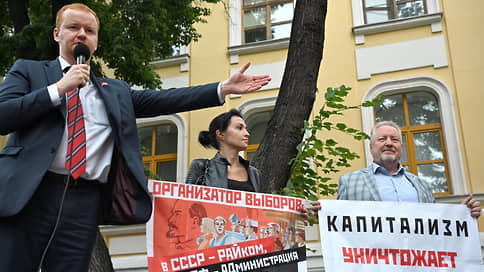Disputes about electronic – Picture of the day – Kommersant
[ad_1]

The Communist Party of the Russian Federation is dissatisfied with the high turnout in remote electronic voting (DEG) on the first day of municipal elections in Moscow and has prepared a number of appeals to the Central Election Commission (CEC) on this issue. Party members talk about the facts of forced mobilization for the DEG, raise questions about its transparency and point to failures in voting at polling stations. However, experts believe that it is now difficult for the communists to make claims to the electronic expression of will: having refused full-fledged mobilization for the DEG, the leadership of the Communist Party will no longer be able to complain about the low online results of their candidates.
At the end of the first day of voting, on September 9, representatives of the Communist Party criticized the ongoing municipal elections in Moscow. The secretary of the Central Committee of the Communist Party of the Russian Federation, State Duma deputy Sergei Obukhov said that he had already sent several requests to the CEC related to the technologies that the Moscow authorities had introduced for this vote. First of all, the communists have traditionally criticized the DEG, which is organized in Moscow on its own platform.
Mr. Obukhov says that even before the vote, he sent a request to the Ministry of Digital Development with a request to present system security certificates. However, there, according to the deputy, he was told that they did not have them. “This suggests that there is no control over the system,” the communist believes.
In addition, according to him, already on the first day of voting, representatives of the Communist Party recorded a number of anomalies related to the DEG and the unified electronic voter register introduced in Moscow for the first time. So, Mr. Obukhov is sure that a very high turnout in online voting indicates that employees of budgetary institutions are being forced to express their will in this particular way. “Kommersant” previously reportedthat more than 1 million voters voted electronically on the first day of elections in Moscow. “Coercion to DEG has already become the new norm in Moscow. This is happening everywhere in all metropolitan state institutions and state companies,” the communist is indignant.
In addition, he draws attention to the failure that occurred on the regular sites on Friday. Recall that in the middle of the day in Moscow, the system for scanning voters’ passports “frozen”, through which data was entered into a single electronic register. Because of this, the citizens who came to the polling stations simply could not vote. “It’s either gibberish, or it’s also coercion to vote on the DEG,” Sergey Obukhov believes. He also fears a repeat of the situation with the elections to the State Duma in 2021: then seven candidates from the Communist Party were in the lead in their single-member constituencies based on the results of counting paper ballots, but lost the elections after the results of the electronic declaration of will were made public.
However, the head of the Foundation for the Development of Civil Society, Konstantin Kostin, believes that the indignation of the communists will lead to nothing, since they initially chose the wrong electoral strategy in relation to the DEG.
“They did not mobilize their voters for electronic voting and, on the contrary, motivated them more to vote in person. And in this situation it is very difficult to question the results of the DEG. It’s one thing when you have proof that people voted for you. Another is when you yourself did not call for the use of this tool,” the expert explains.
Mr. Kostin is sure that the communists had to agitate their voters, especially the activists, to vote through the DEG: then, in case of any distortions, it would be possible to justifiably raise a question about this, appealing to the countable number of supporters who used this form of voting. “And now it looks like their voters have gone to their dachas because of the good weather, and they just understand that the mobilization at the polling stations has failed. And it is no longer possible to urgently convince your voters to vote electronically,” sums up Mr. Kostin.
Political scientist Konstantin Kalachev also believes that the Communist Party of the Russian Federation is “frightened” by the high turnout at the DEG, since they themselves did not actively agitate their supporters for this method of voting. At the same time, it is quite easy to explain why the DEG will have a higher percentage for candidates from the authorities, the expert notes: “This is a convenient tool for loyal voters who prefer to pay their civic duty on Friday and leave themselves a free weekend.”
In addition, the voting of those who choose to vote on the DEG because of the prizes promised by the Moscow authorities will most likely turn out to be loyal. “These are people who are not negatively charged. And they, too, usually vote on the first day. They probably wanted to test their fortune as soon as possible, ”the expert suggests.
[ad_2]
Source link








